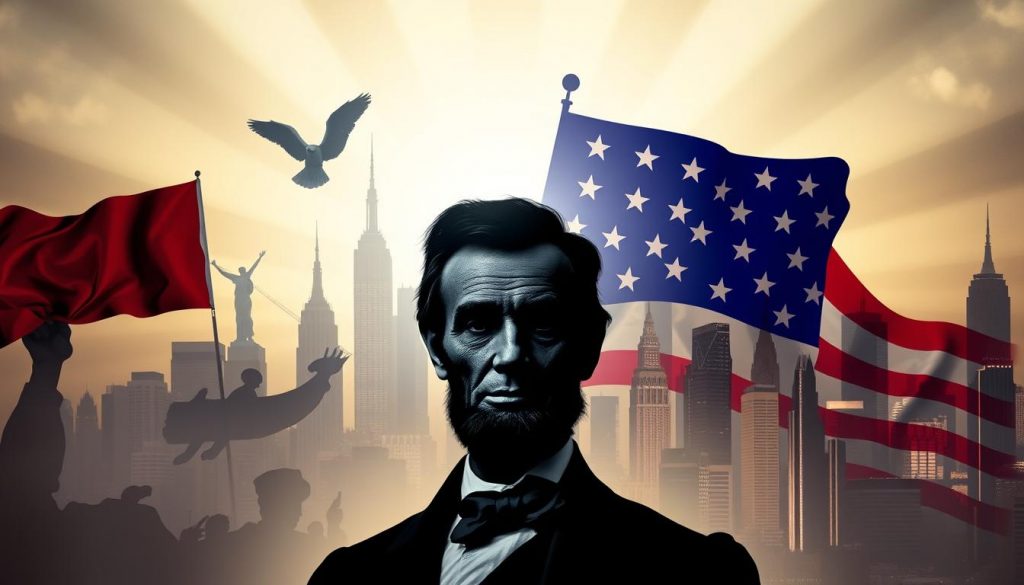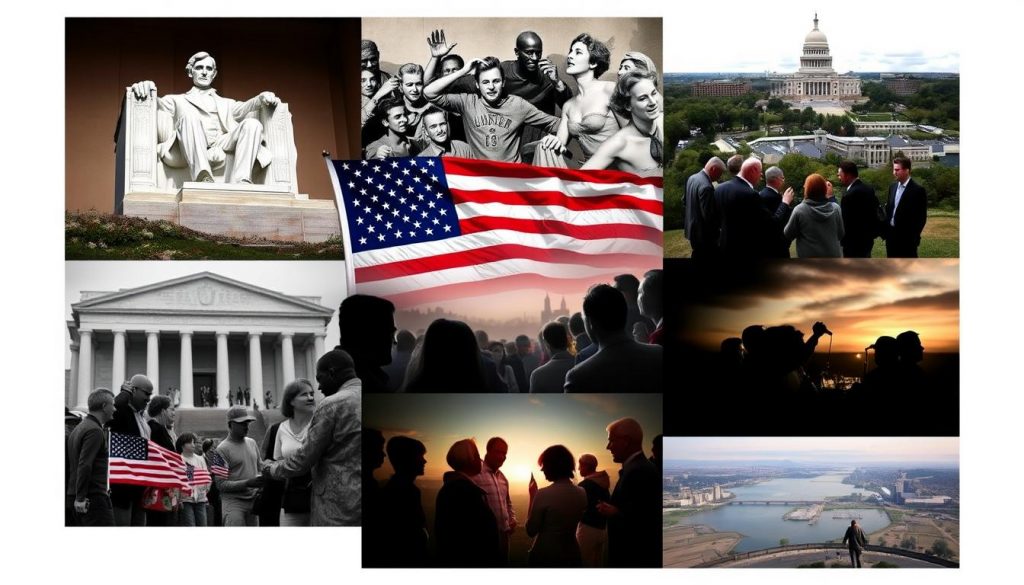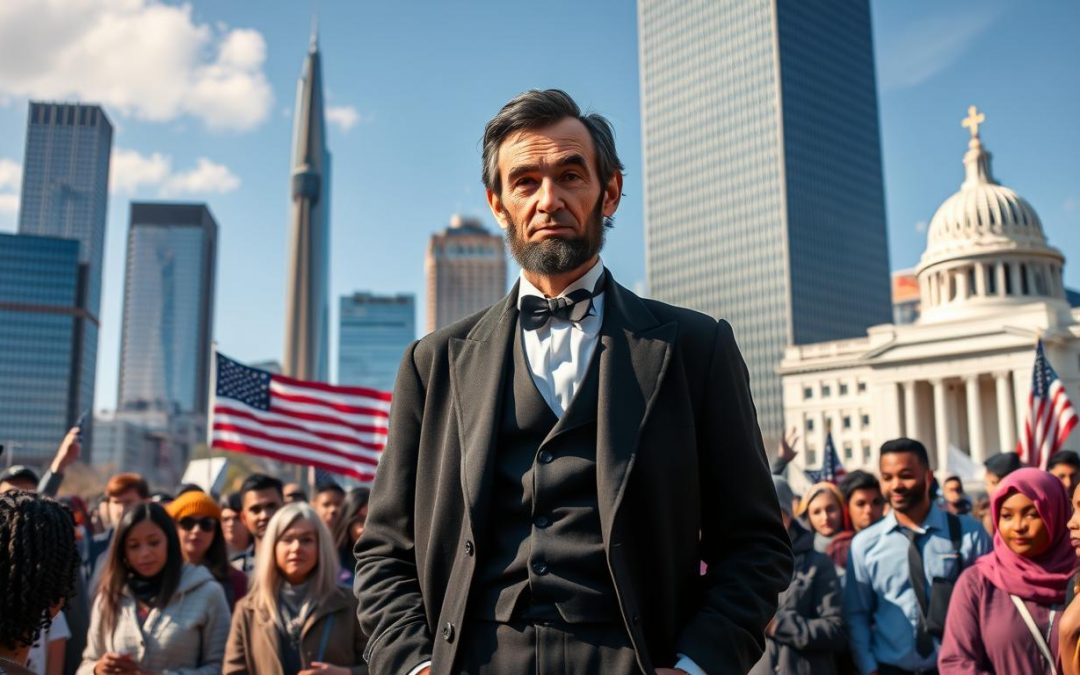Eighty percent of Americans think the country is more divided than in the 1960s civil rights era. This shows how deep the divisions are in our society. Looking at abraham lincoln, the 16th president lincoln, reminds us of his power to bring a fractured nation together. His life and legacy show his strong commitment to keeping the union united and ending slavery.
In this article, we’ll look at how abraham lincoln‘s leadership and wisdom are relevant today. We’ll see how his presidency can teach us about effective leadership. It shows the value of putting the nation’s needs before personal or party interests.
Key Takeaways
- The legacy of abraham lincoln inspires Americans to strive for unity and justice.
- President lincoln‘s dedication to the union and ending slavery teaches us about strong leadership.
- Studying american history and abraham lincoln teaches us about effective leadership and national unity.
- The principles of president lincoln can help solve today’s social and economic problems.
- American history is full of abraham lincoln‘s wisdom, giving us valuable lessons for today.
The Legacy of Abraham Lincoln: A Bridge Across Time
Abraham Lincoln’s presidency was known for his strong moral compass and great communication skills. These traits helped him unite the nation during the civil war. His efforts to keep the Union together and end slavery have greatly influenced American history.
The emancipation proclamation in 1863 was a key moment. It set the stage for the end of slavery and a more just society.
Lincoln’s wisdom is timeless, inspiring leaders today. His gettysburg address shows his skill in making complex ideas simple yet powerful. As an american president, his legacy connects the past to the present, teaching valuable lessons for the future.

Key Leadership Qualities That Defined His Presidency
Lincoln’s leadership was marked by his strong moral compass and coalition-building skills. His dedication to the Union and equality has shaped American history. Today, his legacy reminds us of the need for strong leadership and moral courage in the face of inequality and social justice.
Why Lincoln’s Wisdom Remains Relevant Today
Lincoln’s wisdom is as relevant today as it was during his time. His ability to simplify complex ideas, as seen in the gettysburg address, is a lesson for today’s leaders. As the nation faces new challenges, Lincoln’s legacy teaches us the value of strong leadership and moral courage.
Understanding Modern America’s Political Fractures
The united states history is filled with many factors that cause today’s political divide. Abraham Lincoln, as an american president, greatly influenced the country’s path. The lincoln memorial reminds us of his legacy and the need for unity.
Recently, the U.S. has seen deep divisions. These are due to party lines, different ideologies, and social issues. These divisions make it hard to tackle big problems like economic inequality and racial justice. Understanding these complexities helps us see why we need strong leadership and finding common ground.

Looking back at the united states history and the role of an american president, we see leadership’s importance. The lincoln memorial symbolizes hope and unity. It reminds us of the need to work together to face the country’s challenges.
Lincoln’s Approach to National Unity
Abraham Lincoln was all about finding common ground and building coalitions. He wanted to unite Americans and create a fair society. His calm leadership helped to ease tensions and bring people together.
Lincoln knew that racism was a big problem in the country. He used his skills to communicate and build coalitions. This way, he brought people together to work towards a common goal. His leadership is a great example for today’s leaders.
The Power of Measured Response
Lincoln’s calm approach to crises helped prevent more problems. This method can help solve today’s issues like corruption and social justice. By being thoughtful, leaders can build trust and unity.
Building Coalitions Across Party Lines
Lincoln was great at working with people from different backgrounds. He found common ground and promoted unity. Today’s leaders can learn from him by building coalitions and finding shared goals.
From Civil War to Culture Wars: Drawing Historical Parallels
The american history of the civil war is a key moment in the country’s fight for unity and equality. Abraham Lincoln, the 16th president, was key in shaping the nation’s future. Today, we see parallels between the civil war and modern culture wars, showing how identity, morality, and power issues continue to affect America.
Understanding these parallels helps us see the ongoing fight for unity and equality in the U.S. The civil war was a turning point in american history, and its impact is felt in today’s debates. Looking at Lincoln’s experiences and challenges helps us understand the complexities of today’s culture wars.
The legacy of the civil war and Lincoln’s leadership teach us valuable lessons for today’s american history. By drawing parallels and looking at the ongoing fight for unity and equality, we can strive for a more harmonious and inclusive society.
How President Lincoln Would Navigate Social Media
As an American president known for his exceptional communication skills, President Lincoln would likely approach social media with a unique blend of dignity and humility. Today, social media is like the modern town square. It’s where people share ideas, discuss current events, and connect with others. President Lincoln, believing in unity and respectful dialogue, would use social media to promote positive change and connect people from different backgrounds.
By using social media, President Lincoln could reach more people and share his vision for a united America. He would listen to people’s concerns, address their questions and fears, and offer guidance during uncertain times. His commitment to maintaining dignity in digital discourse would encourage others to engage in respectful conversations.
President Lincoln, a leader who values words and empathy, would build virtual bridges on social media. He would share stories of everyday Americans, highlighting their struggles and triumphs. This would promote a sense of shared humanity and common purpose. Through his social media presence, he would show that kindness, compassion, and respect are key to a stronger, more united America.
Economic Inequality: Lincoln’s Possible Solutions
Exploring Abraham Lincoln‘s life and legacy shows his deep commitment to equality and justice. His ideas can guide today’s efforts to tackle economic inequality. Lincoln’s support for education, infrastructure, and social welfare programs laid the groundwork for reducing economic gaps.
Lincoln believed everyone should have chances to grow and develop. He wanted to make sure everyone had access to education and infrastructure. This way, everyone could play a role in the economy. Today, we see that quality education and job training can help close the wealth gap.
Policymakers can follow Lincoln’s lead to build a fairer society. By tackling economic inequality at its roots, we can make progress. Lincoln’s wisdom helps us find ways to overcome this challenge. As we look back at American history and Lincoln’s legacy, we see the ongoing fight for equality and justice.
Addressing Racial Justice Through Lincoln’s Lens
Abraham Lincoln was deeply committed to racial justice. His emancipation proclamation was a key moment in the fight for equality. It was a big step towards ending slavery and promoting equality for all.
Lincoln wanted a fairer society, not just with the emancipation proclamation. He aimed to tackle deep-seated inequality and discrimination. His leadership and wisdom inspire today’s civil rights movements. The gettysburg address is a powerful symbol of his dedication to racial justice.
Looking back at Lincoln’s legacy, his fight for racial justice is clear. His efforts to promote equality and unity offer valuable lessons for today. Lincoln’s legacy reminds us of the ongoing need for racial justice and equality for everyone.
The Spirit of the Gettysburg Address in Today’s America
The gettysburg address is a key moment in american history. It reminded us of equality, liberty, and democracy. Abraham Lincoln’s words, as the 16th president, inspire and guide us today. The Gettysburg Address’s spirit is as relevant now as it was then, helping us understand our challenges and opportunities.
In american history, the Gettysburg Address shows the value of unity and the fight for equality. Lincoln’s message of hope and perseverance is as powerful today as it was then. It encourages us to strive for a more perfect union. Reflecting on the Gettysburg Address reminds us of Lincoln’s lasting legacy and the need to protect democracy.
The Gettysburg Address highlights the power of leadership and clear communication. As we face today’s complexities, Lincoln’s words and commitment to democracy inspire us. Embracing the Gettysburg Address’s spirit, we can aim for a future filled with equality, liberty, and justice for all.
Lessons from Lincoln’s Cabinet of Rivals
As an American president, president Lincoln is known for his leadership skills. He built a cabinet with people from different backgrounds. This approach, known as Lincoln’s Cabinet of Rivals, teaches us about bipartisan leadership.
Lincoln’s cabinet showed the strength of diverse views. It was a mix of people with different experiences. This mix led to better decisions and teamwork.
In today’s politics, bipartisan leadership is key. President Lincoln’s legacy reminds us to work together, not just for our parties. His way of building a cabinet shows us how to lead effectively and unite a divided nation.
Building Bipartisan Leadership
Lincoln was great at listening and finding common ground. He built a cabinet that showed the nation’s diversity. This is a lesson for today’s politicians, as we face our own divisions.
Finding Strength in Diverse Perspectives
Diverse views are essential in governance. Lincoln’s cabinet proved that bipartisan leadership leads to better decisions. As we move forward, we must value diverse perspectives and follow Lincoln’s example.
Constitutional Challenges: Then and Now
The United States has faced many constitutional challenges in its history. These challenges have shaped the country’s growth and development. From debates over federalism and states’ rights to today’s discussions on individual freedoms and national security, the united states history is filled with key events.
In american history, Abraham Lincoln’s presidency was a turning point. His leadership during the Civil War and the rebuilding that followed set important precedents. These precedents helped define the balance of power between the federal government and the states.
Preserving Democratic Institutions
Lincoln’s dedication to keeping the Union together and protecting democracy is key to his legacy. His way of handling constitutional challenges teaches us valuable lessons today. The country is dealing with complex issues like federal power, individual rights, and social justice.
Balancing Federal and State Powers
The balance between federal and state powers is a big issue in united states history. Looking at Lincoln’s methods for tackling constitutional challenges gives us insights. It shows the need for cooperation, compromise, and understanding of american history and its lasting effects on the nation.
Healing a Divided Nation: The Lincoln Blueprint
Today, the United States faces division, but abraham lincoln stands as a beacon of unity. His efforts to unite the nation offer a blueprint for today. President Lincoln believed that a united nation is stronger, even with differences.
The idea of healing a divided nation is timeless but urgent today. By studying abraham lincoln‘s methods, we learn how to foster unity. This means valuing diverse views and bringing people together, not apart.
President lincoln‘s blueprint centers on justice and equality. Addressing the root causes of division leads to a fairer society. This is a tough goal but vital for our nation’s future.
We must hold onto abraham lincoln‘s vision for a unified America. By following his lead, we can build a better future. Together, we can achieve the dream of healing a divided nation.
Conclusion: Learning from Lincoln’s Wisdom in Modern Times
Reflecting on Abraham Lincoln’s life and legacy, we find his wisdom and leadership lessons for today. His dedication to keeping the United States united and his fight for racial equality are key. His understanding of governance shows us the way through our current political and social troubles.
Lincoln’s approach to overcoming challenges can guide us today. He built alliances, communicated effectively, and made tough choices for the good of all. These actions are a blueprint for leaders aiming to mend our nation’s divisions.
Lincoln’s wisdom inspires us to keep the American dream alive. By following his example, we can uphold the democratic values he cherished. Together, we can strive for a more just and united society, one that would honor this remarkable president.


